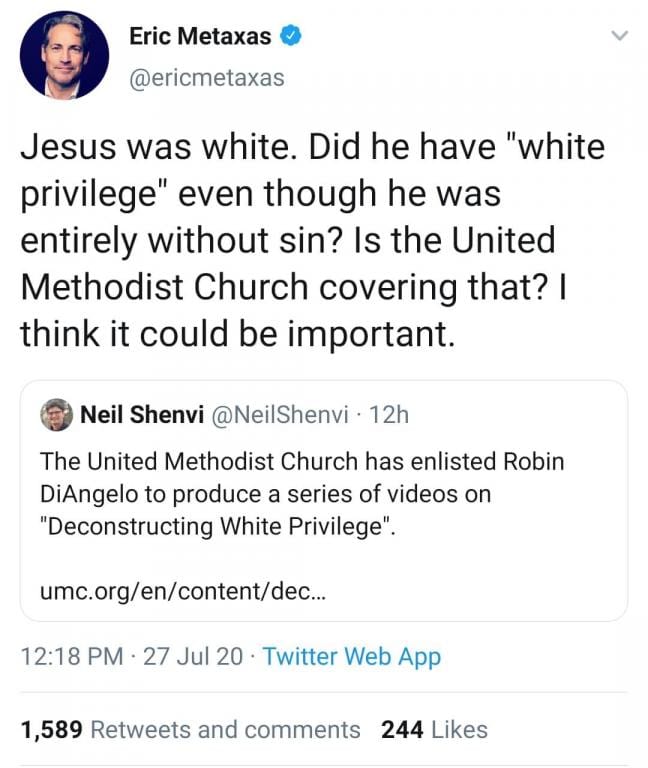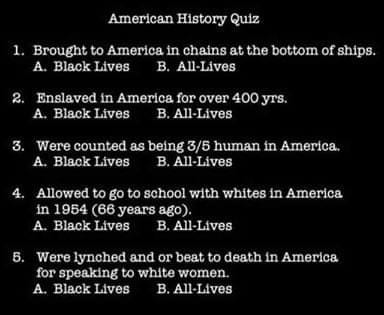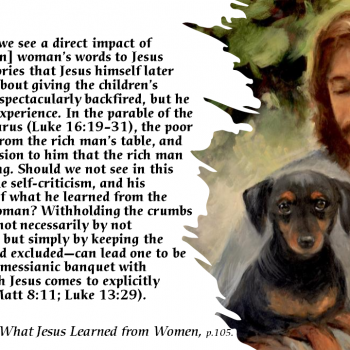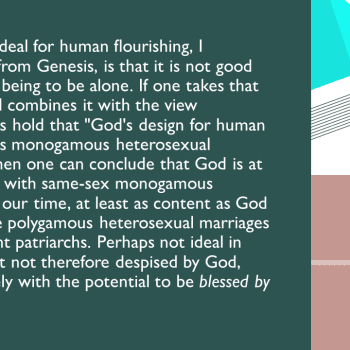Eric Metaxas tweeted the following and it is getting a lot of attention:

The main thing that is being said in response is that “Jesus wasn’t white.” The timing was perfect to have shared a blog post yesterday featuring an AI-produced face of Jesus based on art, which shows him as a Middle Eastern man. Taking that approach may not get very far, since plenty of “white people” will happily argue that people in the Middle East are “white.”
That leads naturally to what I think is a better response, which is to use the opportunity to highlight that the racial category of whiteness and the privilege that comes along with it is a legacy of European colonialism and ethnocentric nationalism. Until you have Columbus and others traveling to the Americas and European Christians debating whether the inhabitants there are human beings with souls, you don’t have modern racism. Until you have a major European trade in African slaves in which skin color becomes a marker of status, and in which context arguments are made that there is something inherently different about black Africans that makes it natural and appropriate for them to be slaves, andyou don’t have modern racism and the establishment of white privilege. But that latter example brings the heart of the matter of white privilege and its colonialist context into focus. Being African in a non-colonial African context did not automatically entail anything about whether you were slave or free, rich or poor. Being white in Europe prior to the era of European colonialism and it was the same. Start building an imperial economic endeavor that leads to the equation of black skin with being property and white skin with being free, and the situation becomes very different. It creates the category of “whiteness” in its modern sense, and the privilege that goes along with it. If you lived on a plantation in the American south in the era of slavery, you would be aware that you had white privilege. You might be rich or poor, but you weren’t a slave. How can anyone living in a society that is clearly still impacted by and built upon those institutions and the economic impact thereof claim not to understand how whiteness continues to carry privilege, even if not in precisely the same way, as a result of that past and the fact that the cultural and economic legacy of that past has yet to be fully dismantled?
It is appropriate to recall in this context that the Nazi ideology as it developed in Germany drew heavily on American racism, and it categorized Semitic peoples, which included not only Jews but many others historically located in the Middle East, as racially inferior. In Nazi Germany as in the United States a percentage of black or Jewish blood was enough to cause you to be considered tainted, less than pure Aryan. The whole idea of race that is at the heart of this is nonsense. But it is nonsense developed into an ideology precisely to bestow privilege on some and take it away from others. That is why it is necessary to emphasize that black lives matter until all lives genuinely matter equally, which cannot happen until the culture that created racism is obliterated.

Jesus could not have had white privilege in the sense that this European colonial enterprise brought it into being in a later time period. That is the thing so many white Americans who are ignorant of history seem not to understand. Our whiteness and blackness isn’t something that has always been a facet of being humans with different shades of skin color. It is a cultural creation of white Europeans, and the responsibility for dismantling it has been bequeathed to their descendants as an inheritance.
I won’t revisit the question of Jesus’ social status again to ask in what ways Jesus might have been privileged in his own time and context. Neither Eric Metaxas nor I relates to race, political power, or wealth and the economy in precisely the way Jesus did. There are elements of privilege that are inherent in merely living in the present day in democratic societies, which again we needn’t focus on here. But before concluding I want to draw attention to the fact that Metaxas has helpfully drawn attention to a problem inherent in the doctrine of Jesus’ sinlessness. It fails to address the fact that sins are not purely individual matters. That includes not only modern forms of racism as sin but also things like economic injustice. That is why so many privileged white Christians bristle equally at the mention of social justice in the same way they do when racism comes up. There is a desire to insist that our hands are clean, that we have done nothing wrong. When sin is societal, that is impossible to do. Recognizing that sin is societal means that even Jesus cannot have lived in a way that was completely free of entanglement in it, no matter how much effort he may have put into forming a community that treated property, gender, and other things in ways that were more just. Metaxas asks an appropriate theological question and I think it deserves a serious theological answer, because otherwise we will continue to see white privileged Christians doing what Metaxas does in his tweet, namely using a doctrine about Jesus to justify the dismissal of uncomfortable truths about our entanglement with our current socioeconomic reality. If we believe that Jesus was human, then there was no way that he lived his life completely disentangled from all societal structures and institutions that were in some way unjust. To give one concrete example, his very birth led to his family offering the poor alternative as a sacrifice to complete his mother’s purification. Jesus would later challenge the temple as an institution and predict its destruction. He did not sin by being born. Yet as the Psalmist famously said, even in birth we are entangled with iniquity, even if we are not personally responsible at that point. But that doesn’t mean we have no responsibility to seek to change those things later in life. Many reject that institutions can be sinful, that a culture can be sinful, and that people can be simultaneously dissenters from and complicit beneficiaries of those structures and entities. That is because we think of sin as only an individual matter. It is precisely because so much Christianity in the United States has reinterpreted the teaching of Jesus within a cultural and societal framework radically different from his, an individualistic one, that American Christians can find ourselves so often standing diametrically opposed to what Jesus stood for and viewing things so differently than how he viewed them.
On that last point see further: “How Black Lives Matter Is Teaching Us To See Systemic Problems Again”
How Black Lives Matter Is Teaching Us To See Systemic Problems Again
Paying attention to the intersection and entanglement of social values and sin at the cultural level can also help us diagnose the underlying causes of other problems, as in this example highlighted by Paul Krugman:
Non-American friends sometimes ask me why the world’s richest major nation doesn’t have universal health care. The answer is race: we almost got universal coverage in 1947, but segregationists blocked it out of fear that it would lead to integrated hospitals (which Medicare actually did do in the 1960s.) Most of the states that have refused to expand Medicaid coverage under the Affordable Care Act, even though the federal government would bear the great bulk of the cost, are former slave states.
The Italian-American economist Alberto Alesina suddenly died on March 23; among his best work was a joint paper that examined the reasons America doesn’t have a European-style welfare state. The answer, documented at length, was racial division: in America, too many of us think of the beneficiaries of support as Those People, not like us.
Also related to this:
Eric Metaxas: Jesus Was White, Did HE Have ‘White Privilege’?
http://feedproxy.google.com/~r/RedLetterChristians/~3/CoE_uxtWkyY/
For more on these topics see the following earlier posts on my blog:
See also:
How to Confront a Racist National History | The New Yorker
White Supremacy and Christianity in the United States
Yes, There’s Something You Can Do
Lament’s Crucial Role in the Ministry of the Church
https://friendlyatheist.patheos.com/2020/07/27/christian-author-eric-metaxas-jesus-was-white/
https://thewayofimprovement.com/2020/07/28/court-evangelical-jesus-was-white/













